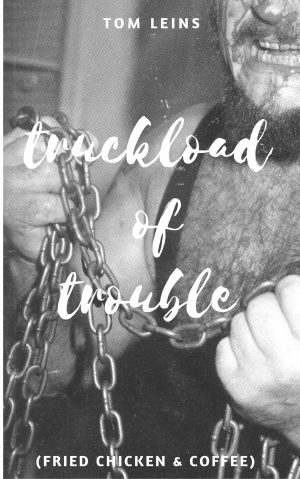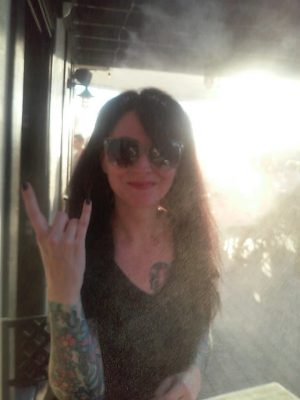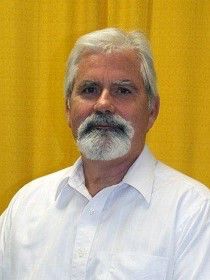There are two main sections in the family cemetery, the unfortunate "soldiers of the cause" and the "damned Yankees." Factions of my kinfolk still don't speak to one another due to choices made during the War Between the States. This inability to agree is a clan trait.
The last time any of us from West Virginia had been to the farm some twenty-two years before, Grandma and her sisters had a spat with not a word exchanged since. Two of Grandma's maiden sisters still lived there because they couldn't agree on how to split the property. Israel and Palestine could give diplomacy lessons to our family. Because I loved my grandma and because she begged me, I agreed (with great reluctance) to take Grandma back to her childhood home the summer of 1985.
When I was a child, my family went to the farm during my breaks from school and it was heavenly. My younger sisters, Sally and Liz, and I twined daisy chains for hours and wore them as proudly as Mardi Gras queens. Sally gobbled apples from the orchard limited only by yellow jackets and tummy aches.
Eventually I'd tire of my sisters. A cool drink from the pump presented an excuse to sit with the women while they gossiped, deftly paring away the walls of our neighbors' private lives along with the apple peels that fell from their razor-sharp knives. The few times a vehicle came up the dirt road, someone would look up from her work and make an explanation for the disturbance: "That's old man Bryson's grandson, carrying the grandchildren in from Roanoke."
As a child I thought these women knew everything and everyone and lived an ideal existence there on that farm. But it had been twenty-two years since my last perfect summer on the farm, and now seven of us were traveling 168 miles crammed together in a stifling Lincoln Continental, like hogs going to slaughter.
To take Grandma home.
A lot had changed since the three sisters' argument back in 1963. President Kennedy had been assassinated, man walked on the moon, Pop-Tarts were invented, and the interstate system had been completed. Grandpa was the tour guide on every trip to the "country," as we called it and well before the Equal Rights Amendment was proposed, I had been taught never to question his word. Unfortunately, my grandfather had never driven the interstate and even worse, I was unaware of this. Both my ignorance and obedience proved regretful.
The Scandinavian region is famous for their saunas, but southern West Virginia in July is an immense steam bath. A sauna is hot, but at least it's a dry heat. Late July in southern West Virginia feels like a blistering barber towel on your face. The humidity takes your breath away with a make-you-wish-for-winter kind of hot. We took Grandma home during dog days in August, and August in southern West Virginia makes July feel like Christmas.
This particular August day, six of us were in my Daddy's brand-new Lincoln Continental. It had sleek leather seats and total climate control. The air conditioner could form ice on the windows — probably could have snowed inside if you wanted. That car was bought for total luxury, for traveling in comfort. I couldn't live without air conditioning, but my grandparents never lived with it. Grandpa didn't like air conditioning — didn't trust it, swore it would lead to his death from pneumonia — so six of us traveled in Dad's new Lincoln with our legs glued by perspiration to the leather seats so Grandpa wouldn't die
from pneumonia.
Well, actually, there was a seventh occupant — Grandma Virginia. The heat never did bother Grandma.
Besides, she was cremated three days before.
Grandpa's eyesight was bad and he couldn't drive any more. I was the only other one in the family with a license, and I volunteered to take Grandma home. My parents were divorced and I had to move Heaven to talk Daddy into loaning me his car. I drove a Mercury Lynx and it just would not accommodate six passengers.
Grandpa was horrified when I suggested we put Grandma in the trunk, and so Grandma rode without a seat belt, on Sally's lap. I figured no further harm would befall Grandma if we had an accident. As I helped Grandpa with his seat belt, I noticed a Folger's coffee can between his legs.
"You know I have trouble with my bladder," he grumbled.
My joy at working out the seating arrangements dribbled away with the mental image of Grandpa fumbling with his can and spilling its contents inside Daddy's new car.
Our journey started off with a quiet, pleasant mood. It was early and the sun hadn't risen above the mountains yet. Mom, Sally and Liz chatted happily and counted animals in the fields we passed. Grandpa and the baby slept. It was the most peaceful hour of the trip.
Soon the sun topped the mountains and warmth quickly added to the discomfort of the already humid air. Mom lowered her window to allow some air movement but Sally whined, "My hair's getting mussed and I just had it done!" I turned the climate control on and we got a moment's relief before Grandpa hollered he was going to catch his death. Mentioning the word "death" set Liz off keening and wailing in a crying jag, and Sally glared at me. (Thank goodness for rear view mirrors or I never would have known). The baby was miserable and began to cry. Mom was miserable and began to cry. I told Mom it would be all right. (I told the baby that it would be all right but she knew more than the rest of us and continued to wail).
Sally started fooling with her hair and bumped Grandpa's arm with her elbow, hitting his Diet Coke can. Watching Sally glare at me in the rear view mirror, I caught a glimpse of the white-and-red can spinning wildly in mid-air before it fell and Grandpa yelled "Land-a-Goshen!" Liz turned to see what was going on just as Sally, trying to avoid the soda spewing from Grandpa's pop can, moved sideways and caught Liz's eye with her elbow.
I was busy keeping the car in its lane at 65 mph and trying to watch the events in the back when Grandpa called out, "Turn around, we've gone too far!" I exited the interstate at the next exit. As soon as I stopped, the family scrambled out of that Lincoln like clowns from a circus car.
Mom checked Liz's eye while Liz wailed Sally had "done it on purpose." Sally climbed out, patted her hair, and insisted it was Grandpa's fault. Mom declared Liz's eye was swollen and sure to bruise. I took the baby out of her seat and began rocking her (she had started crying again). Grandpa struggled to get out of the back of the car and defend himself against Sally's accusations.
Suddenly it dawned on me the genuinely important issue was to clean the spilled soft drink so Dad wouldn't kill me when I returned his new car!
I thrust the baby into Sally's arms and dug furiously through the diaper bag for something to clean the spill. Everyone was bickering on the left side of the car, so I ran around to the passenger side. Realizing Liz was no longer holding Grandma's ashes, I peered inside and saw the box had tipped and now rested with its lid open on the transmission hump.
Grandma's ashes spilled over into the well where Grandpa’s feet had been right before he kicked over the Folger’s can. The contents of the coffee can and the ashes formed a murky sludge in the well. The Diet Coke can added a surrealistic cherry-on-top dash to the appalling scene.
I wasn't sure which was worse — the gruesome mix in the floor, or the rest of the family learning what was in the floor. I hastily righted the box.
I knew my father would kill me when I got home. I figured my Grandpa would keel over with heart failure before we got to Dublin. Three funerals in one week were two too many for any family, so I devised a plan.
"Why don't you-all go inside that restaurant and get cleaned up and order some lunch," I suggested, knowing my family would never turn down a chance to eat. "I need to clean the spill back here, and then I'll join you," I added, as they began to walk toward the building.
Sally held the baby just a little too far away from her body to look natural. I had to smile. She was probably concerned the baby would mess up her pantsuit somehow. Grandpa huffed and puffed, trying to gain the lead from Sally. Mom comforted Liz, who was still holding her eye and crying.
A lot of the ashes were still in the box but I couldn't help wondering what wasn't. Shuddering, I realized that line of thinking wasn't beneficial and forced myself to detach and address the task at hand, and I cleaned the mess the best I could. Perspiration trickled down my back as I entered the restaurant's ladies room. With a silent apology to Grandma and God, I rinsed out the Folger coffee can, washed my hands thoroughly, rinsed my face and joined the family at the table.
"Did you get it all cleaned up, Gee?" Mom asked. Sally looked especially interested in my answer.
"Yes, it's all cleaned up."
I wasn't hungry — guess it was the heat — so I sipped ice water while everyone else ate lunch. When we got back to the car, Liz realized I'd left "Grandma" in the hot car by herself and began to weep again.
Sally snapped, "Hush up, Liz! Grandma never minded the heat one bit and I doubt she minds it now after being cremated, for God's sake!"
Grandpa pulled a bandana out of his pocket and loudly blew his nose. Back to the car we traipsed. Everyone had settled down. Full bellies have that effect.
"Where's my pee can, Gee? Don't wanna forget that," he added. I set the coffee can between his feet and helped him with his seat belt. Liz and Sally refused to speak to one another or even ride beside each other, so Liz and Mom got in the back seat, and Sally climbed up front with the baby (who was hungry again by now). I began to nurse the baby and asked Grandpa if we could turn the air conditioner on.
"Not unless you want me to catch my death," he told me again.
Considering the trouble I'd gone through to prevent that very thing, I figured we could endure without air conditioning for a while longer. As soon as the baby was fed, I used the last of the wet wipes to clean her, and we set off for Grandma's home place in Dublin, Virginia.
We hadn't traveled too far when I started wondering if we were going the right way. Grandpa was sure we'd shot past our exit while all the excitement was going on, and he told me to continue backtracking. I really couldn't remember so I exited and stopped at a gas station. The attendant told me I needed to turn around and head the other way for about thirty miles or so, and I'd see the Dublin exit.
Grandpa refused to believe the man, saying, "He's just some dumb country cuss, Gee. He's prob'ly never been ten miles from whatever town it is he grew up in." I reckoned Grandpa had been down to the farm hundreds of times, so he had to be right.
We continued on our Grandpa-directed journey until he saw a road sign that indicated we were approaching the Wytheville/WV Turnpike exit.
"Turn around, Gee, turn around," he grumbled. "You're going the wrong way."
I knew better than to point out he was the one who insisted we go this way. We exited at Fort Chiswell and headed back toward Dublin. No one spoke. Even the baby was silent.
It was oppressively airless in the car. Starting to feel sick, I eased the windows open. Sally didn't complain about her hair even though it had wilted and was clinging for dear life to her sweaty red face. Mom stared silently out the window. Liz had fallen asleep leaning on Mom's shoulder. Grandpa watched out his window for a familiar landmark. I started to wonder what the temperature was inside the car, and if the heat could somehow damage
the leather upholstery.
"You've gone too far again, Gee!" Grandpa bellowed. Startled and confused at how I could possibly have missed the Dublin sign, I slowed down and got into the right-hand lane.
"Grandpa, I didn't see a sign for the Dublin exit."
"You're flying down this freeway so fast, nobody saw it. But there was a sign saying Roanoke, and that's too far!"
In a split second I realized what had happened. Having never driven the interstate, whenever Grandpa saw the sign for Roanoke, he assumed we were about to reach Roanoke, so he thought we'd gone too far! I explained that to Grandpa (and convinced him it was true), and we made pretty good time the rest of the way. A trip that should have taken under three hours had turned into nearly six, and we still had to scatter Grandma's ashes and return home.
Grandpa easily recognized the right route once we got to Dublin and soon we were out in the country. I pulled onto the winding lane in the family cemetery beside the old Methodist church. The church looked just as I remembered it — well, maybe it had a fresh coat or two of white paint added since I was a child, and the men's and women's outhouses had been chained and padlocked. The church doors were locked too, something unimaginable when I was a child. Essentially though, the church's appearance remained unchanged. It was as if we had been transported back to 1963.
I found my great grandparents' tombstones right next to the gravel road. We each spoke our parting tender words about Grandma and sang a few hymns. Grandma's favorite song, "Carry Me Back to Old Virginny," was sung as we scattered her ashes. Interestingly enough, this was the official state song of Virginia until 1997 when it was declared the song emeritus and a new song chosen. I figure the references to "Massa" and "darkey" finally became too much for even the most tolerant of black folks 130 years after the "War Between the States" ended. I imagined my great grandparents there to joyfully greet Grandma as we sang the last lines:
"Soon we will meet on that bright and golden shore,
There we'll be happy and free from all sorrow,
There's where we'll meet and we'll never part no more."
After prayers were said and tears were shed, we wordlessly climbed back into the car. There were just six of us returning to West Virginia. This was Grandma's last trip back home. Ashes to ashes, dust to dust, she was once again in the care of her parents and the land she'd grown up on and loved so well. I felt a quiet satisfaction for my role in completing the circle of her life here on earth.
I also felt a rumbling in my belly.
And it wasn't a gentle rumble that nudged me and said "Hey, you forgot to eat," but a not-so-early warning of impending intestinal explosion. The hours of oppressive heat and pent-up stress hit my gut with the force of a train derailing. I had to go to the bathroom — now. Vivid images of padlocked chains around the outhouses and locked church doors taunted me. With startling clarity, I realized that we'd have to stop at the farmhouse.
Using reason is always pointless once my pigheaded relatives get set on a concept, and my futile attempt to use logic to sway my grandfather demonstrates what a state of panic I was in. I blurted "Grandpa, we gotta stop at the farmhouse and tell Aunt Joyce and Aunt Ellie about Grandma before we go" in a desperate bid not to reveal my intestinal situation.
"I forbid you to go there, Gee. Grandma hasn't spoken to those women in over twenty years, and I won't disrespect her memory by starting now."
"But Grandpa," I pleaded, "They don't have a phone and I can't call them and I have to use the bathroom — and I have to go now!" When all else fails, tell the truth.
Grandpa refused to go onto the porch once we got to the farmhouse. Mom, Liz and Sally loyally remained in the car, and I raced across the spacious wrap-around porch and pounded on the front door. After an interminable wait (during which my fear the sisters had gone into town for something and I was stranded with no relief in sight threatened to become the last straw in my ability to contain myself), two tiny shriveled old ladies peeked through a lacy curtain and stared at me curiously.
"Hello, Aunt Joyce and Aunt Ellie" — I didn't know which was which. "I'm Gee, Virginia's granddaughter from West Virginia — you know, Lilly's daughter?" I prayed they weren't hard of hearing so I didn't have to repeat myself. Time was indeed running out. I just prayed nothing else did.
The sisters turned to look at one another in perfect synchronicity like mechanical toy mice or mirror images. No word was spoken but some telepathic agreement was reached, and the door opened.
"Come in, come in. You're all grown up now, Gee. How's Virginia?" the mirror image on the left said.
Employing what few diplomatic skills I possess, I tried to convey the urgency I was feeling and said, "Oh my gosh, I hate to burst in and ask this, but my tummy's real upset and I need to use the bathroom." By now I was bent over holding my lower belly with both hands and squeezing my legs together.
"Right this way," said the mirror image on the right, indicating the room to her left. Excusing myself, I dashed past the mirror sisters, ran through the bedroom and entered the kitchen. I saw the toilet through a doorway on the far side of the wall. Relieved, I entered the bathroom, hurriedly closed the door behind me and pulled the chain to turn on the overhead light. That's when I noticed the tub was full of potatoes. Disbelieving, I saw the sink was filled with apples. Worst of all, there was no water whatsoever in the toilet bowl.
Panicking and bewildered, I turned back to the kitchen. The mirror image sisters had caught up and were smiling at me.
"Um, where can I use the bathroom," I asked, hopeful they could point to some secret place in the two-room farmhouse I hadn't already seen. They looked at each other simultaneously, employing that same secret telepathic timing, and the sister on the left said, "Papa never finished hooking up the plumbing to the bathroom. You can use the chamber pot," and she pointed to a bedside commode with a lid on it. The right side sister removed the cover with a graceful flourish that would put a French chef to shame, revealing a banana peel at the bottom.
Thoroughly defeated, far past discomfort and in actual pain now, I could wait no longer. The mirror sisters were virtual strangers — I didn't even know which was Joyce and which was Ellie — but I knew I couldn't delay another second. I barely sat down in time. This was truly the worst moment of my life. Here I sat in the most humiliating situation I'd ever been in, doing the most embarrassing thing I'd ever done in front of anyone.
The mirror sisters calmly looked on as if I were only tying my shoe. "Where is Virginia?" the left mirror sister asked.
"Yes, how is she?" the right mirror sister inquired.
Minimizing my bodily noises, I wondered what the etiquette in such a situation was.
Panting, I thought out what to say.
"Well … Grandma has been very sick for a long time … and actually … she passed away … I'm sorry … a few days ago." The mirror sisters turned to look at one other as calmly as if we were all sitting at the kitchen table drinking cider and I'd just said Grandma was in the car and would be right along directly.
"Where will she be buried?" the one on the left asked.
"Yes, where will she be buried?" the one on the right parroted. Oh, hell, I thought. It just keeps getting better.
They stood, patiently waiting for an answer. I sat, patiently waiting for toilet paper.
"Um, excuse me but where is the toilet paper, please?"
"Oh, we keep it in the bedroom and bring it back and forth when we need to," Left Mirror Sister answered. Right Mirror Sister disappeared into the other room and returned with the toilet paper roll.
I had been wrong; that hadn't been the worst moment of my life. It was getting worse. Lacking the nerve to ask them to leave at such a crucial time in breaking the news, I performed the final humiliating paperwork with an audience blandly looking on, expectantly waiting for an answer.
"Well, Grandma wanted to be cremated. She asked me to scatter her ashes on your parents' graves, and we just did that before I stopped here to inform you."
Both my jobs were done. Now all I had to do was craft small talk, wash my hands, and make my get-away. Once again, the plan was easier developed than carried out.
The mirror sisters walked out to the car with me. Mom and my sisters got out and the five women began talking and weeping. Grandpa took a little longer to warm up, but eventually he too chatted with my great aunts. He even knew which was Joyce and which was Ellie.
Aunt Ellie (Left Mirror Sister) admired the baby and told me how much she looked like my Grandma Virginia. Grandpa seemed to get along better with Aunt Joyce, and they moseyed down the lane to continue their conversation. The rest of us walked around the farm, lost in our own memories.
A little later, we all went inside. Chairs materialized and we sat around the rough kitchen table and continued chatting. Everyone ate thick ham sandwiches prepared by Aunt Ellie while I nursed the baby. Grandpa helped Aunt Joyce pull an ancient trunk out of the bedroom closet and we looked through family photographs dating back to the Civil War. Listening to stories about all those dead relatives made me sad knowing another had joined their ranks.
We hugged, kissed, promised to write one another and visit again soon. The West Virginia branch of the family piled back into the car to return home. Just before I backed down the drive, I asked Aunt Joyce what the sisters' disagreement had been all those years ago.
"You know, Gee, I don't remember."
"Neither do I," Aunt Ellie added.
It was dark by the time I got on the interstate. Each of us was exhausted from the trip, the
heat and the emotional toll, and soon all my passengers (except Grandpa) were sleeping.
"Thank you, Gee, for what you did today."
"You're welcome, Grandpa. I was honored to be able to do it."
"No, I mean bringing the family back together. Thank you for that."
"You're welcome, Grandpa. I love you."
"I love you too. I have a favor to ask."
"What's that, Grandpa," I asked, a little nervous and hoping he didn't ask me to take some back country road that I was sure to get lost on.
"When I go, do you promise to scatter my ashes where Grandma's ashes are?"
"On two conditions."
"What conditions," he asked.
"One, that you don't try to give me any directions on the way down. If you do, I swear my hand to God I'll throw your ashes out on the interstate."
He laughed and agreed. "What's the other condition?"
"That I can run the air conditioner and you won't complain about it, even if you do catch your death of pneumonia."
Grandpa chuckled, then giggled, then laughed till he had to wipe away tears with his old bandana. He was once again my ornery joke-loving grandfather for the first time since Grandma passed away. Soon, he nodded off to sleep. I drove the rest of the way without once getting lost except in my own thoughts about family relationships and how easily rifts form for silly reasons.
The next evening, I received an irate phone call from my Dad. He'd found the Diet Coke can under the front seat of the Lincoln.
"Dammit, Gee," he said, "I let you take my new car and I find a soda can under the seat. The least you could have done was thrown it away! You are so irresponsible!"
Before I took Grandma home, I'd have responded with an argument about how responsible I'd been to clean everything else up without anyone even knowing the ashes had spilled. Before I took Grandma home, my righteous indignation would've kicked in and I'd be offended at my Dad's comments. But since I took Grandma home, I drew a deep breath, and simply apologized.
 Ginger Hamilton is a ninth-generation Appalachian writing from a dark hollow in Central West Virginia. More than a dozen diverse print anthologies feature her work.
Ginger Hamilton is a ninth-generation Appalachian writing from a dark hollow in Central West Virginia. More than a dozen diverse print anthologies feature her work.
Recognition for Hamilton's writing includes: Grand Prize in The Binnacle Third Annual International Ultra-Short Story Competition, finalist for the Fifteenth Glass Woman Prize 2014, selected for AHWIR Homer Hickam's Master Class, and a finalist in West Virginia Fiction Competition 2015.
Fun Fact: Ginger Hamilton's story "Bringing Home the Bacon" is used in the curriculum of a senior level Computer Science class (CS-475 Game Development) at West Virginia University. It was also inducted into Fairmont State University's Folklife Center as a story which preserves traditional Appalachian heritage (hog butchering).
 Having grown up in rural Michigan, David Jibson now lives in Ann Arbor where he is an associate editor of Third Wednesday, a literary arts journal, a member of The Crazy Wisdom Poetry Circle and The Poetry Society of Michigan. He is retired from a long career in Social Work, most recently with a Hospice agency. He sees “story” as the most important element of his poems.
Having grown up in rural Michigan, David Jibson now lives in Ann Arbor where he is an associate editor of Third Wednesday, a literary arts journal, a member of The Crazy Wisdom Poetry Circle and The Poetry Society of Michigan. He is retired from a long career in Social Work, most recently with a Hospice agency. He sees “story” as the most important element of his poems.














